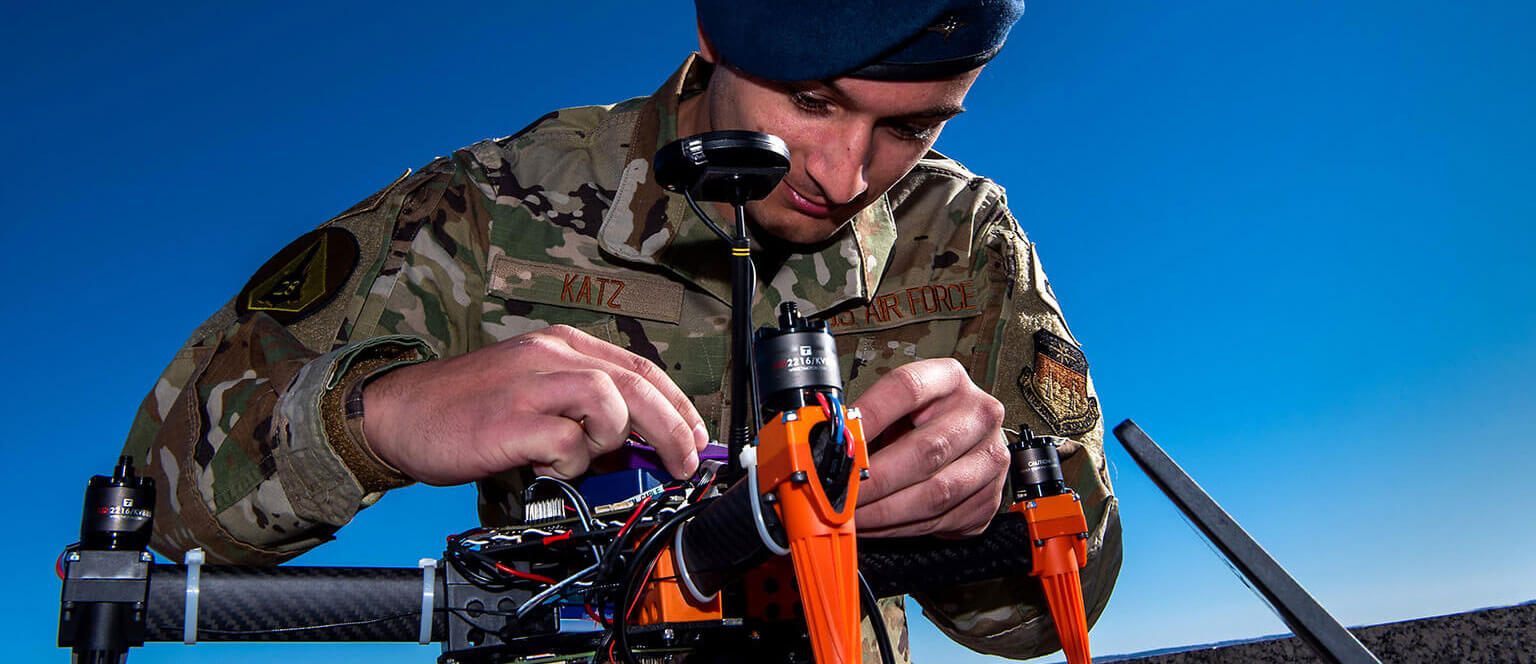Electrical and Computer Engineering

The victor on the 21st century battlefield will likely be the side that can best bend the electromagnetic spectrum to their will. Radar, communication, stealth, “smart” weapons, autonomous aircraft flown by artificial intelligence (AI), fly-by-wire manned aircraft, space-based sensors, offensive and defensive cyber operations, and more all have their roots in electrical engineering. At the U.S. Air Force Academy, the Electrical and Computer Engineering (ECE) major prepares cadets to fulfill their potential as officers and technical leaders by giving them a deep understanding of the principles of modern electronic systems that they can leverage as operators on the air/space/cyber battlefield or engineers developing and testing the sensors, weapons, and capabilities of tomorrow.
The ECE major prepares cadets to become electrical and computer engineers. However, it also opens the door to a variety of Air Force careers that range from U.S. Air Force test pilots to cyber warfare specialists. As an Air Force computer or electrical engineer, you will combine your creativity and analytic ingenuity to optimize existing computing and electrical systems, as well as design new systems that have not yet even been conceived. Air Force officers who understand these emerging technologies can use their expertise to gain a “combat edge” over our adversaries. If you want to foster your understanding of modern technologies and help the Air Force develop new and better techniques to accomplish its mission, this major may be for you.
MISSION
- Dominate the 21st century battlespace
- Fulfill cadets’ potential as officers and technical leaders of character
- Enable technologies to secure our nation’s defense
- Conduct DoD-relevant research
POTENTIAL JOB ASSIGNMENTS
|
|
Required coursework in the ECE major includes the core curriculum and courses that apply physics, mathematics, and computer science, such as electrical circuit and systems analysis, computer systems and architecture, programming, robotics, and signal processing. As an ECE major you will study the fundamental aspects of both computer and electrical engineering. For advanced level courses you can decide to take a computer-focused or electronic-focused track, or a mix of both! Regardless, the ECE curriculum culminates in a two-semester capstone design course, where seniors work on a team, utilizing cutting-edge technology and building on their coursework to design an electronic or computer system that meets the needs of a real customer.
Computer Engineering Track
The advanced courses in the Computer Engineering track allow you to focus on computer and robotics-related topics after learning the fundamentals of both electrical and computer engineering. These topics include AI, data structures, high-level programming, autonomous system integration, digital signal processing and much more.
Electrical Engineering Track
The advanced courses in the Electrical Engineering track allow you to focus on topics related to electronics and signals after learning the fundamentals of both computer and electrical engineering. These topics include antenna theory and design, embedded systems, power electronics, communications systems, and much more.
Objective and Outcomes
To ensure the success of our graduates, we prepare them to attain Program Educational Objectives (PEOs) two to five years after graduation. These PEOs are cadets who major in Electrical and Computer Engineering will have been successful Air Force officers who have:
- Applied their engineering, management, and leadership skills in service to our nation
- Demonstrated intellectual growth through self-study, continuing education, and professional development
- Provided technical leadership and disciplinary knowledge, with a broad understanding of the potential ethical and societal impacts of technology
- Applied engineering methodology and creativity to technological problems while effectively communicating to diverse audiences
The qualities, or outcomes, of the ECE major that prepare each graduate for attaining these PEOs are the following student outcomes:
- An ability to identify, formulate, and solve complex engineering problems by applying principles of engineering, science, and mathematics
- An ability to apply engineering design to produce solutions that meet specified needs with consideration of public health, safety, and welfare, as well as global, cultural, social, environmental, and economic factors
- An ability to communicate effectively with a range of audiences
- An ability to recognize ethical and professional responsibilities in engineering situations and make informed judgments, which must consider the impact of engineering solutions in global, economic, environmental, and societal contexts
- An ability to function effectively on a team whose members together provide leadership, create a collaborative and inclusive environment, establish goals, plan tasks, and meet objectives
- An ability to develop and conduct appropriate experimentation, analyze and interpret data, and use engineering judgment to draw conclusions
- An ability to acquire and apply new knowledge as needed, using appropriate learning strategies.
Cadets who successfully complete the ECE major are awarded a Bachelor of Science in Electrical and Computer Engineering. The ECE program is accredited by the Engineering Accreditation Commission or ABET. The ECE major is an excellent choice if you are interested in an advanced degree. As an electrical or computer engineer, your knowledge and skill will be in high demand in the Air Force and in society as a whole.
CONTACT US
Dr. George York
Department Head
george.york@afacademy.af.edu
(719) 333-3190